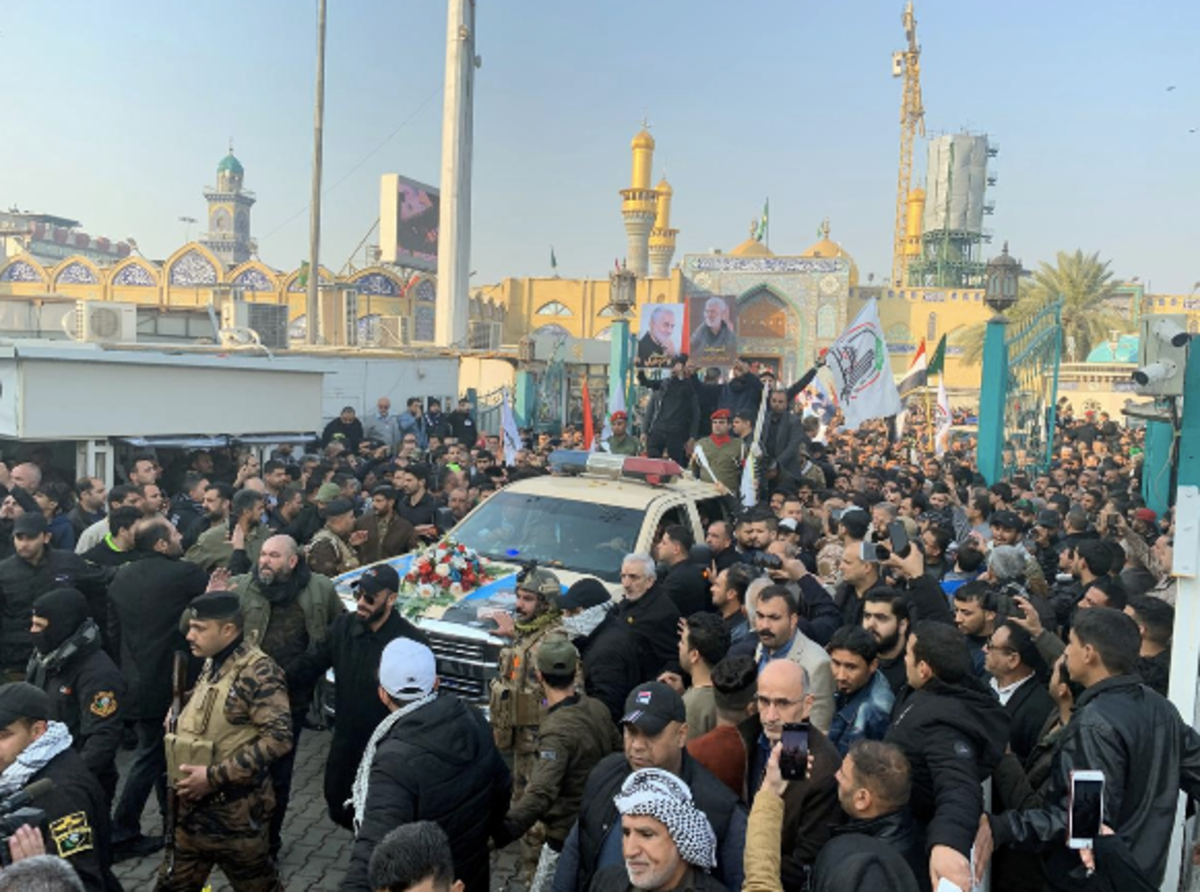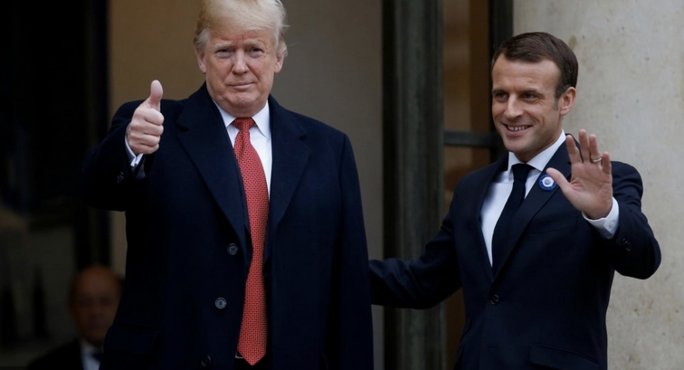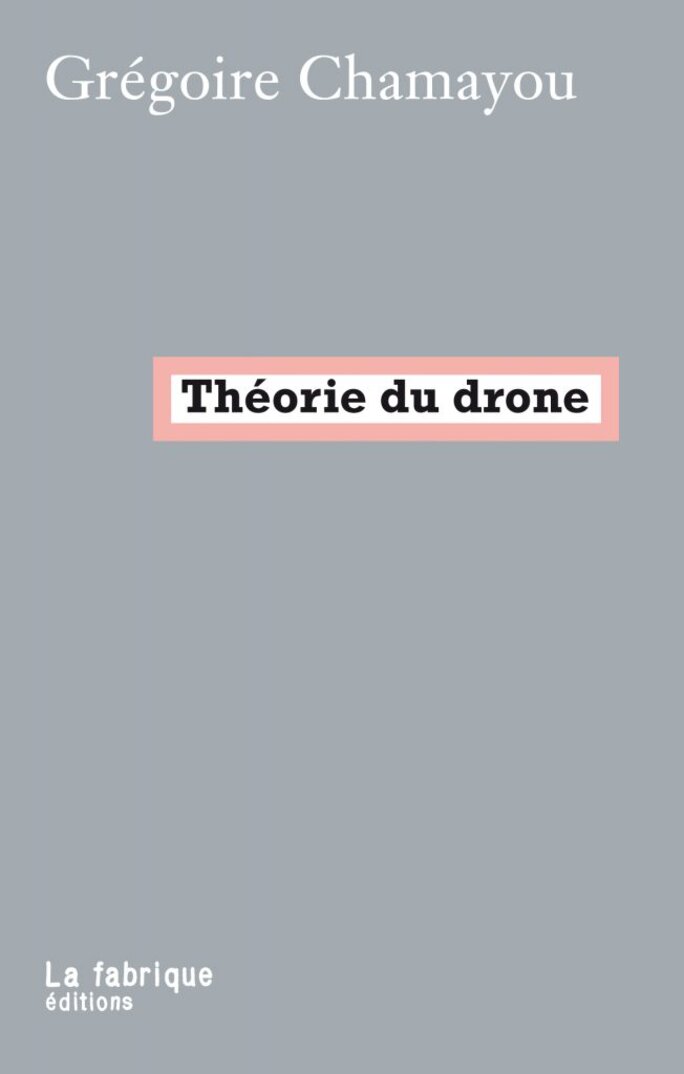On June 28th 1914 the assassination in Sarajevo of Archduke Franz Ferdinand, the heir presumptive to the Austro-Hungarian Empire, and his wife Sophie by a Serbian nationalist was the event which triggered World War I. It was followed by three decades of European catastrophe that lasted right up to the mass murders of World War II.
The future is never written in advance, and we cannot state that the assassination in Baghdad on January 3rd 2020 of General Qasem Soleimani, a leading figure in the Islamic Republic of Iran, on the orders of the president of the United States' president Donald Trump, will have a similar outcome. But in all reason, who would dare to categorically rule such an eventuality?
For it would be wrong to relax, as we can only avert the worst if we accept the possibility that such a potential outcome now exists. All the explosive ingredients of a world conflict are already in place, at the mercy of one action – any action - that is more incendiary than previous ones. The insane order given by Donald Trump is on this level: never has the world's leading military power, the United States, publicly ordered and acknowledged to the world the assassination of a senior figure of a sovereign state which is a member of the United Nations.

Iran is clearly not Islamic State, that pseudo-state that was illegitimate in the eyes of the entire international community, and General Soleimani, an intermediary with the American military in the fight against Islamic State (IS) in Iraq, is in no way comparable to the self-proclaimed caliph of that terrorist group, Abu Bakr al-Baghdadi.
Such an illegal and irresponsible state-sponsored crime can cause chain reactions that run beyond the control of the various protagonists involved. That is even more likely in our post-Cold War world where the balance of power is no longer guaranteed by the stand-off between two solitary great powers. Our world is now definitively multipolar and interdependent, with uncontrollable and reversible alliances, a complex world with no other coherence than the logics of power and interest that confront each other in it.
That is one of the resonances with the pre-1914 period of which the British historian Christopher Clark has given a timely reminder of its modern relevance in his work 'The Sleepwalkers: How Europe Went to War in 1914', published by Penguin in 2013.

That war, which saw sixty-five million solders mobilised, which destroyed three empires, caused twenty million civilian and military deaths, and which left twenty-one million others wounded, was not inevitable. It was possible because, in the sequence of causality that led there, the protagonists were “sleepwalkers, watchful but unseeing, haunted by dreams, yet blind to the reality of the horror they were about to bring into the world,” writes Clark.
There are many sleepwalkers and people blind to the concerns today. There are those who do not want to see - and still less say - that the leading rogue state, with its ability to strike and its capacity to cause damage, one which fuels disorder and causes trouble, and the state whose military action violates international law and tramples on basic morality, is none other than the United States. They have no excuse now given that Donald Trump's erratic behaviour, like some Dr Strangelove putting the world in peril, makes this threat obvious (see this article by Mediapart's François Bonnet about Donald the Thug threatening the world).
The assassination order given by Donald Trump is just the latest illustration of a long series of acts of behaviour about which the French philosopher Jacques Derrida developed a theory. He turned the concept of “rogue state” - an idea created under the presidency of Ronald Reagan to designate states that were being targeted by the United States - against American imperialism itself.

Underlying the extent to which abuse of power consists of a country's sovereignty projected into world domination, Derrida stated in 2003 in his work Voyous (published as 'Rogues' in English): “...Those states that are able or are in a state to denounce or accuse some 'rogue state' of violating the law, of failing to live up to the law, of being guilty of some perversion or deviation, those states that claim to uphold international law and that take the initiative of war, of police or peacekeeping operations because they have the force to do so, these states, namely, the United States and its allied states in these actions, are themselves, as sovereign, the first rogue states.”
The list of such events demonstrating this would be a long one, and would include in particular the lasting injustice done to the Palestinian people despite United Nations resolutions. But sticking to the geopolitical theatre of the clash with Iran – and without going back to the violent overthrow of the legitimate government of Iranian prime minister Mohammad Mosaddegh in 1953 – we simply need to recall the succession of catastrophic decisions taken by Washington after the attacks of September 11th, 2001, the main financing and ideology for which in fact came from the US's main ally in the region after Israel, namely Saudi Arabia.
The 2003 invasion of Iraq, which not only no longer had weapons of mass destruction but which also had no link with Al Qaeda terrorists, was a bellicose adventure without precedent since the colonial conquests. And like those colonial adventures, the Iraq war was accompanied by war crimes if not indeed crimes against humanity, and certainly the generalised use of torture, with the support of American leaders at the time.
Posterity will doubtless tell us that this was a power in decline forging on regardless, so blinded by the loss of control of its destiny that it made rookie errors. Because by overthrowing Saddam Hussein's regime and brutalising Iraqi society, the paradoxical result was to increase the scope for regional power for the US's declared enemy, Iran. For the US ignored the fact that Iraq was the only Arab country whose population is predominantly Shi'a Muslim, the same branch of Islam from which the Iranian clergy come.
The totalitarianism of the so-called Islamic State was born out of this American adventure, with recruitment to its cause helped by the violence of the repression of the civilian populations and its ideology fed by the feeling of resentment by the large Sunni minority in Iraq.
The lack of coherent thinking continues. One of the immediate impacts of the assassination of the Iranian general has been the suspension - by the United States themselves - of the coalition against Islamic State in Iraq. This came at a time when there was a popular protest movement which broke down religious barriers, bringing together Sunni and Shi'a Iraqi Muslims, in common protest against corruption and injustice in Iraq. That included injustices blamed on the Iranian proconsul in Iraq Qasem Soleimani, who was also the co-author of the martyrdom of the Syrian people.
Wounded beasts are often dangerous. In this case for the whole world as well as for their own people. The demonstrations of American power are admissions of weakness. The United States' military domination undoubtedly gives them no guarantee of success or lasting protection.
The failure in Iraq, which is in truth confirmed by Donald Trump's assassination order, was followed by revelations in The Washington Post of the 'Afghanistan Papers' which document American incoherence and powerlessness in a war that has now been waged for more than 18 years. It is a war whose main victim is the Afghan people, a war which kills and wounds mostly civilians and which, in the future, will just sow humiliation and resentment, the ideal fuel for fundamentalists and extremists.

Enlargement : Illustration 4

No world balance will be achieved without a strong condemnation of American adventurism which, far from protecting its allies, exposes them and weakens them.
This is what one was waiting for from France, a non-aligned, free and sovereign France, having become aware of the stalemate in the logic of power, alerted to the fragility of an interdependent world, a France that would defend with the greatest vigour the cause of multilateralism, underpinned by international law, pleading for disarmament and peace. This was the position adopted briefly in 2003 at the United Nations, in the French opposition to the American adventure in Iraq. Alas, it is no more than a distant memory.
Having been integrated into NATO in 2009 under the presidency of Nicolas Sarkozy – he was himself the initiator of the disastrous military intervention in Libya in 2011 – France is not the independent voice needed to rise up against American irresponsibility.
Multilateralism against imperialism
It is true that President Emmanuel Macron hurriedly called the leaders of many different nations, Russia, Iraq, the United Arab Emirates, Turkey and America, in a visible display of multilateralism, but in essence the French reaction to the assassination has been summed up by silence - and the use of one particular word.
The silence involves the absence of explicit condemnation of the Iranian general's assassination, whose legality Agnès Callamard, a Special Rapporteur on extrajudicial, summary, or arbitrary executions at the Office of the UN High Commissioner for Human Rights, has already called into question. Worse still is the fact that the statement relating the conversation that Macron had with Trump described how the French head of state “highlighted his total solidarity with our allies in light of the attacks carried out in recent weeks against the coalition in Iraq … He also expressed his concerns regarding the destabilizing activities of the Quds force under General Qassem Soleimani”.
In diplomatic terms that is equivalent to a blank cheque over the execution of the Iranian general.
The word that sums up France's stance, meanwhile, is “restraint” - “retenue” in French - much used in official statements and in particular this one from the minister of foreign affairs Jean-Yves Le Drian. The word is a neutral way of putting responsibility on all sides by suggesting that as of now the danger for the world is not American obstinacy but the Iranian response. This same call for “restraint” is also found in the official statements from Saudi Arabia and the United Arab Emirates, the main anti-Iranian voices in the region along with Israel.
It is not by accident that in recent years France has let itself fall into a trap which could prove fatal, just as in the 1980s when it supported and armed the Iraqi dictatorship by pushing Saddam Hussein to wage war with the newly-formed republic that had emerged out of the 1979 Iranian Revolution.
Is France not the military ally and supplier of arms to the United Arab Emirates and Saudi Arabia? Is France not involved in the dirty war that these two countries are conducting in the Yemen, by dint of its arms sales? Has France not shown its indulgence towards the Saudi regime, whose violence and sectarianism easily bear more than a comparison with the authoritarianism and intolerance of the Iranian regime? Has France not shown its official cowardice faced with the assassination of the Saudi journalist Jamal Khashoggi, a murder described by UN experts as a “state crime”? Has France not acted shamefully by allowing its public media to compromise themselves over coverage of the Paris-Dakar Rally 2020, an event transformed into a public relations campaign for the Saudi monarchy?
Any support for the logics of power, and thus the notion of domination and oppression, for the old world in decline, will compromise the coming of a new world. This will be a world that is capable of facing the real challenges facing humanity, the most pressing of which is the environmental emergency which links every living creature with the entire planet, the protection of nature with the safeguard of humanity.
Not without sad irony – as they sometimes pay the price with their lives – the first to concretely experience this old world based on power are the soldiers sent abroad to theatres of operation to resolve conflicts whose solutions are primarily social, economic, democratic and environmental. That is obviously the situation for the 4,000 soldiers of Operation Barkhane in the Sahel region of Africa who are already clearly bogged down in stalemate. This is despite the fact that they are working alongside the main UN peace operation, known as MINUSMA, which has some 14,000 personnel in Mali.
From this perspective there is more clear-headedness in the national defence and security strategic review carried out by the French military in 2017 than in the sabre rattling of our presidents, who are wont to project their Élyséen omnipotence onto the world.
When looking back at the predictable failure of Emmanuel Macron, who had claimed in vain he would solve the Iranian-American conflict on his own at the G7 summit in Biarritz, France, in August 2019, one cannot help but recall what that military review document stated back in 2017: “The emergence of this multipolarity and this new competition results in the questioning of the rules and the international institutions which have enabled a legal framework and rules about the recourse to force since World War II. … Some great powers are opting for a stance which overtly favours relations based on power. Yet the UN and its agencies remain essential to run a world presided over by rules that have been adopted collectively. They are fundamental in preventing conflicts, including in their new guises, and in responding to humanitarian crises, giving legitimacy to overseas operations and encouraging stability after military interventions.”
There is no other guide to moving forward in this uncertain and unstable world than that of multilateralism, which respects commitments, treaties, resolutions and, above all, people.
Emmanuel Macron's France would thus be respected if, rather than remaining circumspect as if the wrongs were evenly shared, it had strongly condemned the unilateral breach by Donald Trump's United States of the Iranian nuclear agreement of which it was one of the main guarantors, as France had called for the hardening of its conditions under the presidency of François Hollande.
The fact that in its first diplomatic reaction to the killing of its general Iran announced it would no longer be bound by any of the restrictions imposed by the 2015 deal was inevitable : states - or “cold monsters” as Friedrich Nietzsche called them - never turn the other cheek after they have been humiliated and ridiculed, and are never prone to the grace and goodwill sometimes shown by individuals.
When it comes to individuals and their bravery and prophetic boldness, it was at the International Socialist Congress at Stuttgart in 1907 that French socialist Jean Jaurès without doubt signed his own death warrant. The hate which fuelled the actions of the assassin who killed him on 31st July 1914 – Jaurès was murdered by a French nationalist who wanted France to go to war with Germany – raged after he returned from the congress with a commitment from the gathering about the “great idea of international arbitration”. Jaurès had championed this first setting out of the idea of a multilateral world order, something he saw as a way of avoiding the war he felt might be coming.

Edited by historian Vincent Duclert, the latest volume of Jaurès's speeches and articles covering the period 1905 to 1907 has just been published by Fayard, under the title 'Voici le XXe siècle ! ('This is the 20th Century!'). As for our century, that undoubtedly started in 2001, with the attack on New York, a global earthquake of which the criminal order given by Donald Trump is one of the aftershocks.
That attack was the moment when the politics of fear was adopted and became generalised and, though claiming to defend us, ended up oppresseing us instead. The refrain can be summed up thus: “Be afraid and I'll deal with the rest by taking advantage of the occasion to constrain and subject you, in order to better protect the economic interests of a minority of society.”
This new policy of enslavement and people control came as a new industrial revolution, driven by the digital age, dawned. So it was that General Soleimani and nine other Iranian and Iraqi citizens were killed by a drone. In 'Théorie du Drone' ('Drone Theory') published by La Fabrique in 2013, Gregoire Chamayou states: “...what is at stake politically in the dronization and robotization of the armed branches of the state. The dream is to construct a bodiless force, a political body without human organs, re-placing the old regimented bodies of subjects by mechanical instruments that would, if possible, become its sole agents.”

Enlargement : Illustration 6

The author then refers to the Nietzsche notion of the “cold body of a cold monster” before quoting the German philosopher Friedrich Engels: “...This power, arisen out of society, but placing itself above it and increasingly alienating itself from it, is the state .”
What is at stake in the confrontation between the United States and Iran is therefore not without relevance to what we are experiencing, on the ground here in everyday life, in the defence of our social and democratic rights. In international politics as in national politics the decisive issue is about control of our own destiny, of our common good and thus of our own lives. This is where we get back to the essential, this humanist radicality which was articulated so long ago but which has so rarely been acted upon.
Indeed, it was the philosopher Immanuel Kant, the author of a project for “perpetual peace” in 1795, who made this demand in defending the intangible principle of citizenship, especially when life is at stake: that a state can only declare war if its citizens, who will be the ones risking their lives in it, have expressed their “consent” through a vote.
More urgently than ever we have to retake collective control of our own common destiny in order to stop the war that is coming. This war which cannot be ours under any circumstances.
-----------------------------------------------------------------------
- The French version of this op-ed can be found here.
English version by Michael Streeter


